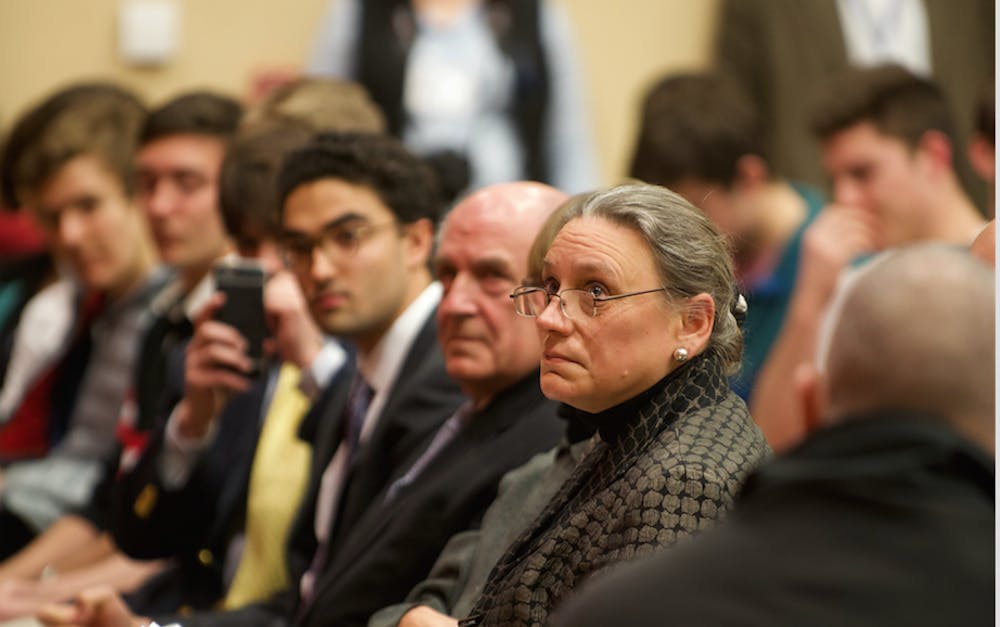The first official judicial hearing for students who participated in the March 2 protests against Dr. Charles Murray is scheduled to take place today, May 4, as of press time.
The hearing will examine the cases of at least 18 respondents — the official term for students who have been charged with violating the College Handbook. The respondents requested to have their hearing as a large group.
The College offered students the option to have their case heard individually, as a member of a small group, or as part of the large group. At the time of this report, no students have chosen to testify as a small group, while a few have opted for an individual hearing. Individual hearings have yet to be scheduled.
The College is viewing the events of March 2 as two separate protests. The first is the protest that prevented Murray from speaking after he took the stage. The second is the one that continued in Wilson Hall as the College live-streamed a conversation between Murray and Allison Stanger, professor of international politics and economics.
Students whom the College believes participated in both the first and second protests are those who are facing official college discipline, and who have opted to go forward with the judicial process. Official punishment is anything that goes on a student’s permanent record.
As reported in the April 27 issue of The Campus, the College has already placed more than 30 students on probation for participating in the first protest. Probation is a form of unofficial discipline, and means that a student will have a letter placed in their file that will be removed at the end semester, as long as they do not violate another college policy.
The 18 students who are proceeding with Thursday’s hearing are not contesting that they violated the “Demonstrations and Protest” policy of the College Handbook. Rather, the hearing will determine the type of sanction that those students will receive. Students who want to challenge the College’s account of what occurred or object to the College’s ruling have been provided with other adjudication options. At this time, it is unclear exactly what those options are. However, according to one person familiar with the situation, they will most likely consist of separate hearings.
SIT-IN
As a response to the way in which the administration has conducted the investigation into the events of March 2, a group of students, with support from faculty members, planned to conduct a sit-in protest in the Services Building on Friday, April 28. Their goal was to push the Middlebury College administration to be more transparent regarding the disciplinary process for students involved in the Murray protests.
The sit-in corresponded with greater efforts from faculty members to seek information from administrators regarding the disciplinary proceedings. Laurie Essig, associate professor of sociology and gender, sexuality, and feminist studies, Linus Owens, associate professor of sociology and Sujata Moorti, professor of gender, sexuality and feminist studies, were among a group of faculty members who reached out to the administration. Initially, they were hoping for more information from the meeting to better understand the disciplinary process and help students who are facing hearings.
“Our original plan was to support students who wanted to take a stand against the opacity of the judicial process,” Moorti said. “We had invited other faculty to join us as well.”
According to Essig and Owens, they were able to set up meetings with Dean of the College Katy Smith Abbott and Provost Susan Baldridge prior to the sit-in.
However, as students and faculty gathered at Crossroads Cafe in preparation for the sit-in, both groups decided to merge the events. Dean of Students Baishakhi Taylor came to the gathering to answer questions at the request of Moorti, according to both Taylor and Moorti.
The crowd of students grew over the course of about two hours. Tyler McDowell ’19, a student who attended, estimated that 40 to 70 students and 10 to 15 professors showed up. Eventually, both Smith Abbott and Baldridge arrived to answer questions.
According to McDowell, many students asked questions about why the disciplinary process has not been a “restorative justice” model. He said administrators explained that there was an attempt last year to implement such a model, but it failed.
In a comment given to The Campus, Katy Smith Abbott said, “I am working hard on a plan for bringing Restorative Practices training to campus beginning in June.”
Restorative justice is a method of discipline that emphasizes reconciliation with victims and the community at large.
“Middlebury could have gone forward with a non-punitive and restorative process,” Essig said. “A decision could have been made that rather than holding students and only students responsible, all involved parties could have been invited to sit down to figure out what happened, what harm was caused and how dissent can happen in the future in productive ways.”
In the end, Moorti said, the administrators decided to allow students to choose a group hearing.
“The meeting has produced mixed results — a shift in the nature of the hearings but no substantive shift toward restorative justice or a clarification of how and what distinguishes unofficial from official college discipline,” she said.
Essig also described the meeting as having at least some positive effects.
“I think Friday showed a possibility that Middlebury as an institution can occasionally stop and actually listen to students when members of the community stand up for our shared values,” she said. “I hope that Friday’s small and momentary break in business as usual might signal that as an institution Middlebury can stop punishing protesters and decide to incorporate dissent into its notions of free speech and academic freedom in the future.”




